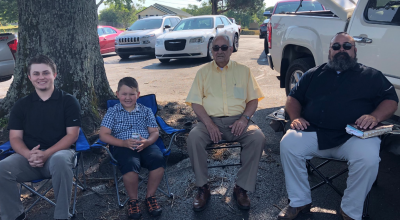
Ubi non est condendi auctoritas, ibi non est parendi necessitas. Where there is no authority to enforce, there is no authority to obey.
Valeat quantum valere potest. It shall have effect as far as it can have effect. — Bouvier’s maxims
A physician with no authority to write law creating a crime is ordering residents of Hamilton County to wear masks in public on penalty of arrest.
By David Tulis / NoogaRadio 92.7 FM
The July 6 so-called health directive effective Friday from Dr. Paul Hendricks of the county health department alleges that disobedience to his order “shall be punishable by a citation” issued by his administrative agency “and/or criminally by local law enforcement as a class C misdemeanor.”
Criminal statutes are written by the general assembly, and codified in Title 39 of the Tennessee code annotated.
Dr. Hendricks’ order is extemporized, and is not part of that code. The two-month directive on chin diapers, however, intends to operate upon private noncriminal activity of people with no known symptoms of the CV-19 virus as if it were a law, “with the force of law,” to borrow a phrase from the state’s emergency powers statute.
The order is like those preceding it from Gov. Bill Lee and local mayors Jim Coppinger and Andy Berke. It is a heroic overreach disregarding limits in lawful power and disregarding the constitutionally guaranteed rights of the people in private matters pertaining to personal health and to free choice regarding personal and public well-being.
He says the citation is “issued by” his department, as if it were a judicial commissioner, or magistrate, who issues warrants for arrest that have met the minimum requirement of oath-bound attestation, a criminal act and power to affect an arrest for a statutory offense. Implied in the order is a type of due process in which the health department hears reports of civil and criminal violations, and in some unknown process gives an OK for a “citation” (civil, criminal) or an arrest (criminal).
The directive says uncooperative businesses are cited civilly, and it indicates uncooperative men and women are subject to the criminal process within the health department as venue.
It is not known how this venue exists, or when it was created. When are citations civil? When criminal? If a cop issues the citation, is that criminal, but if a health department staffer issues it, is that civil? The difference is important, because one venue requires at trial proof beyond reasonable doubt. The other, civil, only a preponderance of evidence.
A civil offense, or tort, is a wrong or action that causes damage. A criminal offense is one that violates a statute or a city ordinance. There appears to exist no authority for health departments, which are administrative agencies serving the executive branch of state government, to establish criminal offenses enforced criminally, with arrest, appearance before the magistrate, bond requirements and/or jail.
Hamilton County is under an administrative notice regarding the limits of the statute that gives exceptions to the general ban on arrests in the Tennessee constitution in the bill of rights, Article 1, section 7. ‡ The notice was received by the county commission and city council April 15 in anticipation of the conflict over masks and other purported health compelling state interests.
A vital protection of liberty

The key point of the administrative notice is this: Having a bare face in public is not a public offense subject to on-the-spot arrest by an officer.
The eight-page analysis of court cases and the concept of statutory construction means that if a state actor wants to arrest a man or woman for not wearing a mask, he is under compulsion of the constitution to go to Lorrie Miller, magistrate, or one of her fellow judicial commissioners, and swear out a warrant.
Warrant process
The swear out of a warrant is under statute. The accuser must allege he saw a person commit a crime, or has reliable information that an individual has committed a statutory offense. He must take an oath before God of this accusation, convince Ms. Miller of the offense, and obtain in his hand from her a warrant for arrest. The deputy or cop uses his best information to get the warrant filled out. He can do it even if he has no name, but only a body-cam video from which he draws a mugshot of the accused. The officer then must go out into city and county to find the person he is accusing of a crime. If his victim gave name and address, his job is easy. If the accused refused to give information to facilitate the warrant process, the officer does the best he can, and spreads word about the person for whom he is looking.
Eventually, he or an LEA colleague arrests the person identified in the warrant. Most likely he would have the defendant’s full personal information, and so could affect the arrest the same day.
This is the warrant process — extremely cumbersome, extremely head-achy, tough and troublesome for the officer and “the system.” But the constitution requires it, as a safeguard of the people’s liberties and rights.
The notice makes clear that the public offense standard controls because not wearing a mask is not on the list of exceptions to the warrant requirement. The list includes suicide, domestic abuse, felonies, car accidents involving DUI or flight. A bare face is not a public offense because it creates no threat, fear, fright, disorder, breach of the peace.
According to the notice, Page 8, “The State ex rel. Thompson court goes for social color to a list of public offenses. “The term, ‘breach of the peace’ is generic, and includes riotous and unlawful assemblies, riots, forcible entry and detainer, the sending of challenges and provoking to fight, going around in public, without lawful occasion, in such manner as to alarm the public, the wanton discharge of firearms in the public streets, engaging in an affray or assault, using profane, indecent, and abusive language by one toward another, on a street and in the presence of others, or being intoxicated and yelling on the public streets in such manner as to disturb the good order and tranquillity of the neighborhood.” 8 Ruling Case Law, p. 285.”
The notice is given to help the people, and to give them great dollar damages if they sue for false arrest outside the scope of the law. Arrests done illegally after administrative notice, I propose, evoke the aggravating elements of knowingness and intentionality.
Does ‘shall’ equal ‘must’?
The order says “all persons in Hamilton County shall wear a facial covering or mask which covers the mouth and nose at all times when indoors in all public and private buildings and when outdoors except under the following exceptions ***.”
What does shall mean? It’s used nine times in the order. Is it universally compulsory, when read with the exceptions, or is it advisory and directory? Sounds like a petty question, but it’s not.
The leading legal dictionary is Black’s. Here’s the fourth edition’s definition of shall.
SHALL. As used in statutes, contracts, or the like, this word is generally imperative or mandatory. McDunn v. Roundy, 191 Iowa, 976, 181 N. W. 453, 454; Bay State St. Ry. Co. v. City of Woburn, 232 Mass. 201, 122 N.E. 268; U. S. v. Two Hundred and Sixty-Seven Twenty-Dollar Gold Pieces, D.C.Wash., 255 F. 217, 218; Baer v. Gore, 79 W.Va. 50, 90 S.E. 530, 531, L.R.A.1917B, 723.
In common or ordinary parlance, and in its ordinary signification, the term “shall” is a word of command, and one which has always or which must be given a compulsory meaning; as denoting obligation.
It has a peremptory meaning, and it is generally imperative or mandatory. It has the invariable significance of excluding the idea of discretion, and has the significance of operating to impose a duty which may be enforced, particularly if public policy is in favor of this meaning, or when addressed to public officials, or where a public interest is involved, or where the public or persons have rights which ought to be exercised or enforced, unless a contrary intent appears. People v. O’Rourke, 124 Cal. App. 752, 13 P.2d 989, 992.
But it may be construed as merely permissive or directory, (as equivalent to “may,”) to carry out the legislative intention and in cases where no right or benefit to any one depends on its being taken in the imperative sense, and where no public or private right is impaired by its interpretation in the other sense. Spaulding & Kimball v. ;Etna Chemical Co., 98 Vt. 169, 126 A. 588, 589; Wisdom v. Board of Sup’rs of Polk County, 236 Iowa 669, 19 N.W.2d 602, 607, 608.
Also, as against the government, it is to be construed as “may,” unless a contrary intention is manifest. Cairo & Fulton R. Co. v. Hecht, 95 U.S. 170, 24 L.Ed. 423. Although the word usually denotes an obligation, it also implies an element of futurity. Cunningham v. Long, 125 Me. 494, 135 A. 198, 200; Hemsley v. McKim, 119 Md. 431, 87 A. 506, 511.
Our protection against these abuses is Sheriff Jim Hammond, whose job is to keep the peace within the county, according to Black’s. “The name of the chief officer of the county. In Latin he is called vice comes, because in England he represented the comes or earl. His name is said to be derived from the Saxon seyre, shire or county, and reve, keeper, bailiff, or guardian.”
Black’s frames Sheriff Hammond’s guardianship job squarely within the limits of public offense, or suppressing public offenses and keeping the peace.
“To keep the peace within the county; he may apprehend, and commit to prison all persons who break the peace or attempt to break it, and bind any one in a recognizance to keep the peace. He is required ex officio, to pursue and take all traitors, murderers, felons and rioters. He has the keeping of the county gaol and he is bound to defend it against all attacks. He may command the posse comitatus. (q. v.).”
‡ Tennessee constitution, Article 1, Section 7. That the people shall be secure in their persons, houses, papers and possessions, from unreasonable searches and seizures; and that general warrants, whereby an officer may be commanded to search suspected places, without evidence of the fact committed, or to seize any person or persons not named, whose offences are not particularly described and supported by evidence, are dangerous to liberty and ought not be granted.



Sounds like the military junta, doing “business” in Hamilton county, has a desire to double/triple the output of the false arrest/imprisonment production line.
After all folks didn’t seem to mind the previous production level.
Did anyone see the facts Dr. Hendricks was using to say the so called pandemic was growing in Hamilton County?
I saw a study being done on the sewer system showing “covid like dna” in the system was suspected to be increasing.
Or was this just another left loon trying to continue fear among the citizens?